Spurring e-government initiatives
 |
The three main types of interactions within an e-government are government-to-customer (G2C), government-to-business (G2B), and government-to-government (G2G). Within the G2G interaction, the relationship of a government to its employees (G2E) can be further separated (see Figure 1).
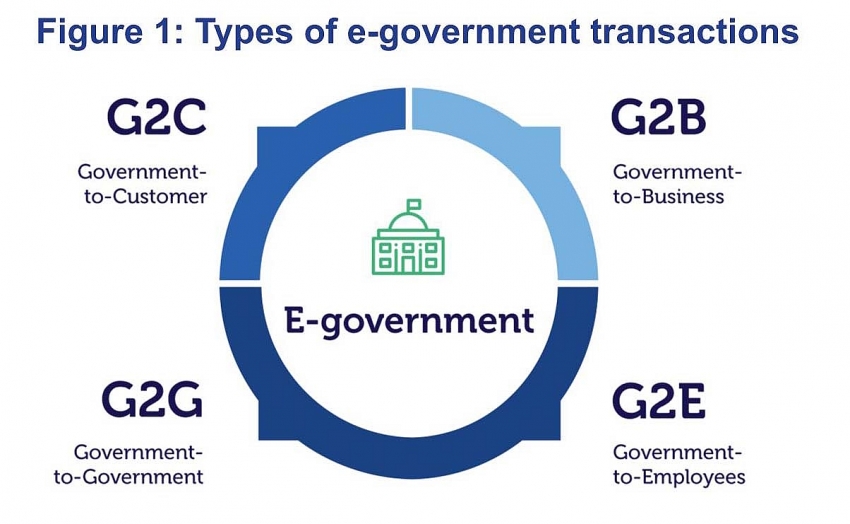 |
The effective implementation of e-government procedures at national and local levels will not only improve the economy’s competitiveness but also enhance citizens’ confidence in the government’s fight against corruption. Especially, e-governments can improve the state budget substantially and reduce opportunity costs, among other benefits specified (see Figure 2).
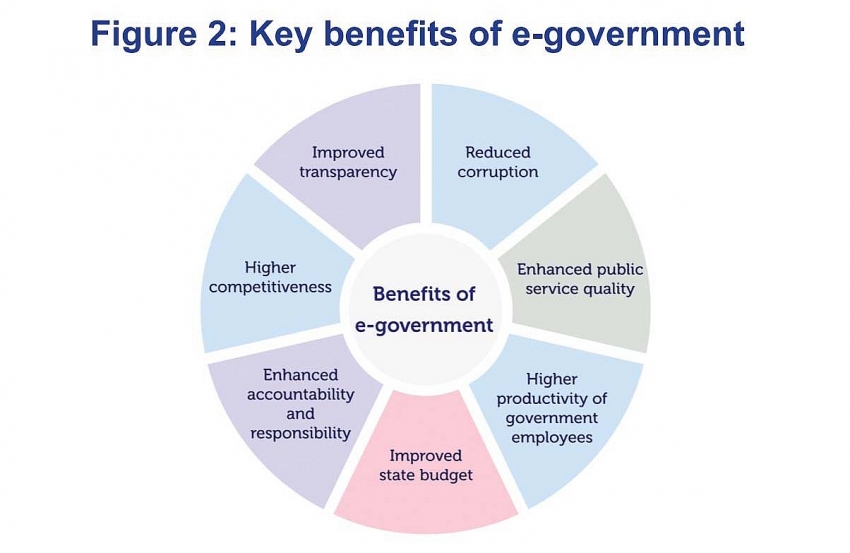 |
For example, the national public service portal alone, launched last December, is expected to save over VND4.2 trillion ($182 million) per year. This also means that the delay of e-government implementation since the late 2000s would have cost the state trillions of VND. It is noteworthy that this amount does not take into account other lost opportunities due to the possible failure to attract sizable investment.
E-government and business
Recent reports published by the United Nations and the World Bank show that countries with high e-government indexes are usually associated with high business environment indexes (see Figures 3 and 4).
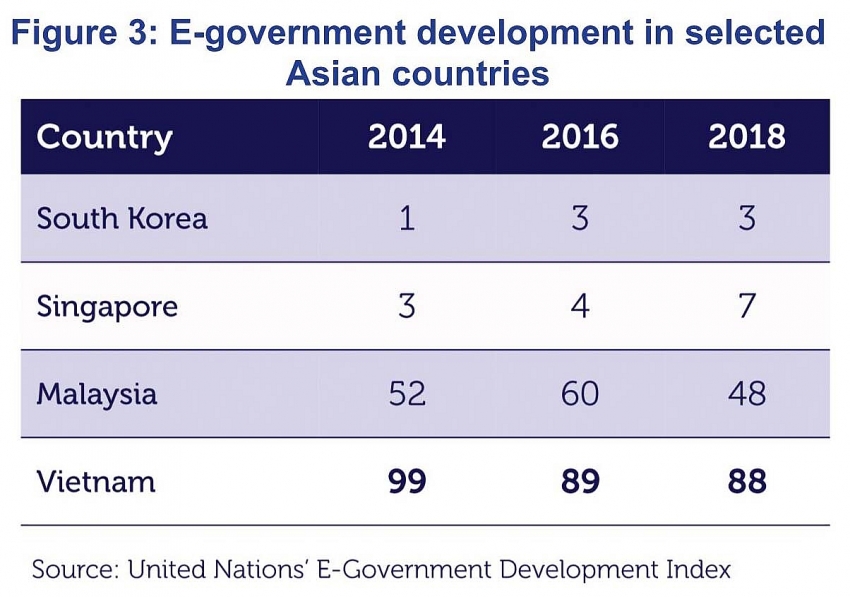 |
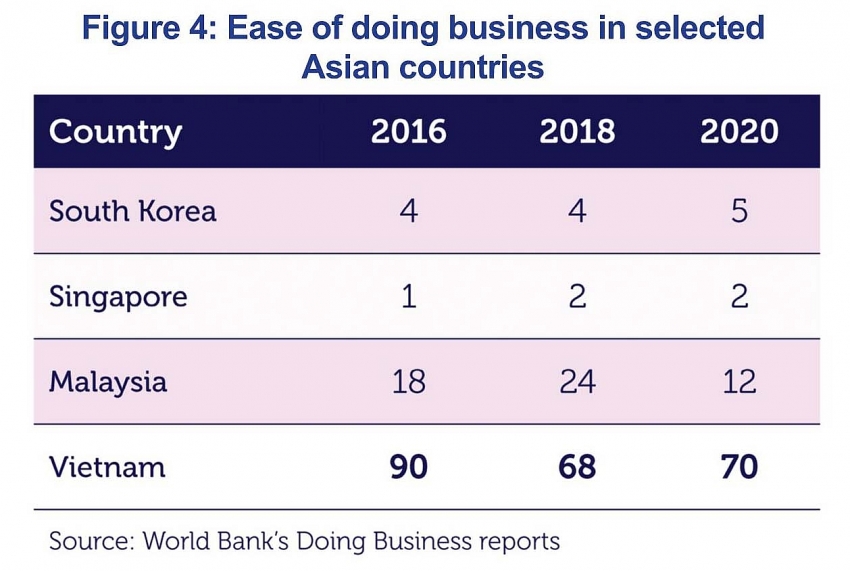 |
A good business environment will attract high-quality investors, creating positive spillover effects such as better technology transfer, modern management practices, and positive impact on the environment. That is why e-government in Vietnam should be a priority. An improvement in e-government implementations would result in improvements in other areas such as reducing business corruption and enhancing transparency.
Policymakers in Vietnam can learn from successful e-government models of Asian peers such as South Korea, Singapore, and Malaysia – examples in which one of the outcomes of this push towards e-government was an increased closeness between government and citizens.
Early and consistent efforts of the leadership of these countries in developing e-government initiatives have greatly contributed to improving their respective business environments. South Korea and Singapore have dominated the top rankings of business environments.
Meanwhile, despite the government’s recent efforts, Vietnam remains at a fairly average position in the global scale compared to other countries in the region.
Vietnam’s e-government development index ranked 88th out of 193 countries in 2018, up one place compared to 2016 but down five places compared to 2012. While the top five ASEAN countries have improved or remained unchanged like Indonesia between 2019 and 2020, Vietnam dropped by one place in the latest ranking of the World Bank.
Similarly, at the local level, e-government is believed to heighten provincial competitiveness. Leaders of local governments usually pay attention to their position in the Provincial Competitiveness Index (PCI) by the Vietnam Chamber of Commerce and Industry and the United States Agency for International Development.
However, attention should now focus more on how to improve their e-government initiatives. Effective implementation of e-government initiatives is likely to result in improved provincial competitiveness. For instance, nine out of the top 15 provinces in the latest PCI report are also leaders in the country’s ICT Index led by the Ministry of Information and Communication to evaluate and rank the readiness for IT development and application in Vietnam.
Implementation keys
Leadership awareness of the critical roles of e-government is one of the first steps towards an effective e-government. This is because implementing e-government initiatives requires a huge amount of resources, and the process takes time.
Lessons from other countries show that the common factors influencing the success of e-government initiatives include governance capacity, ICT infrastructure, human resources, and socio-economic attributes (see Figure 5). Apart from ICT, the human factor within a government is more important in the implementation of e-government initiatives. In the case of Vietnam, there have been some positive signs. The government’s great efforts in building and implementing e-government initiatives have been recognised by experts and citizens alike.
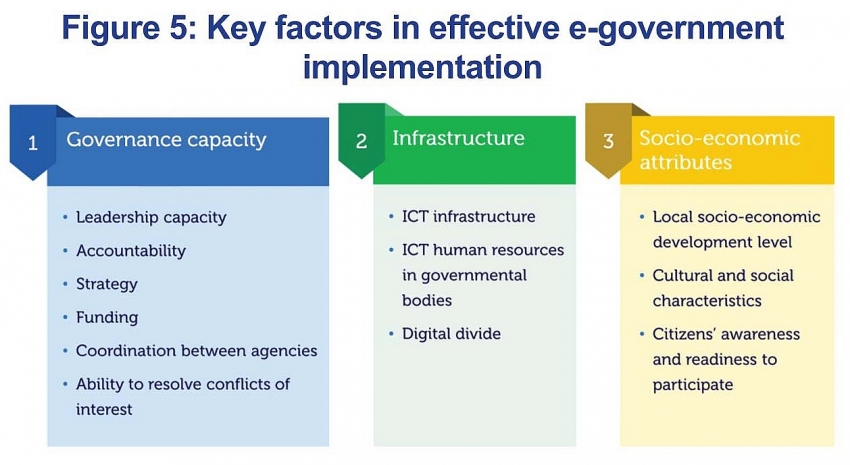 |
In August 2018, the government set up the National Committee on E-government of which the prime minister is the chairman. In March last year, Resolution No.17/NQ-CP was issued to cover key tasks and solutions for e-government development in 2019 and 2020, with a view to 2025. More recently, this February, the government organised a national online conference of the National Committee on E-government together with the e-government steering committees of ministries, industries, and local governments.
Major projects include the E-cabinet launched in June 2019 and the national online public service portal launched in December.
In order to create competitive advantages and improve Vietnam’s business environment, governments at all levels must make more efforts and commit more resources for e-government development. The failure of e-government initiatives in the 2000s might have discouraged many leaders, but this is an important and urgent task that requires strong focus if the country wants to achieve goals of prosperity, creativity, equity, and democracy as specified in the Vietnam 2035 Report by the Ministry of Planning and Investment and the World Bank.
This is now an even more pressing issue because the government needs rapid solutions to stimulate economic development during and after the pandemic. In this context, the successful development of e-government should be seen as a key priority. A successful e-government will spur quick improvements in other areas, saving resources for society and increasing the overall competitiveness of the economy.
* Dr. Nguyen Quang Trung has a history of successful teaching and leadership at RMIT Vietnam. Prior to his position at RMIT, he worked at FPT Corporation and Open University in Ho Chi Minh City. Trung has a PhD degree in management from Monash University in Australia, a master of arts in economics of development, and a bachelor’s in foreign trade. His research interests encompass public management, international business, and development economics. His research has been published in books, journals, conference proceedings, and the media.
* Tran Pham Khanh Toan is a PhD candidate and an official in the People’s Committee of District 10 in Ho Chi Minh City. He worked at the city’s Department of Industry and Trade for nine years. He obtained his master’s degree in economics from Open University in Ho Chi Minh City, and a bachelor’s in public administration from the National Academy of Public Administration. His research interests include public governance, development economics, and digital transformation management.
What the stars mean:
★ Poor ★ ★ Promising ★★★ Good ★★★★ Very good ★★★★★ Exceptional
Themes: Digital Transformation
- Dassault Systèmes and Nvidia to build platform powering virtual twins
- Sci-tech sector sees January revenue growth of 23 per cent
- Advanced semiconductor testing and packaging plant to become operational in 2027
- BIM and ISO 19650 seen as key to improving project efficiency
- Viettel starts construction of semiconductor chip production plant
Related Contents
Latest News
More News
- State corporations poised to drive 2026 growth (February 03, 2026 | 13:58)
- Why high-tech talent will define Vietnam’s growth (February 02, 2026 | 10:47)
- FMCG resilience amid varying storms (February 02, 2026 | 10:00)
- Customs reforms strengthen business confidence, support trade growth (February 01, 2026 | 08:20)
- Vietnam and US to launch sixth trade negotiation round (January 30, 2026 | 15:19)
- Digital publishing emerges as key growth driver in Vietnam (January 30, 2026 | 10:59)
- EVN signs key contract for Tri An hydropower expansion (January 30, 2026 | 10:57)
- Vietnam to lead trade growth in ASEAN (January 29, 2026 | 15:08)
- Carlsberg Vietnam delivers Lunar New Year support in central region (January 28, 2026 | 17:19)
- TikTok penalised $35,000 in Vietnam for consumer protection violations (January 28, 2026 | 17:15)

 Tag:
Tag:




















 Mobile Version
Mobile Version